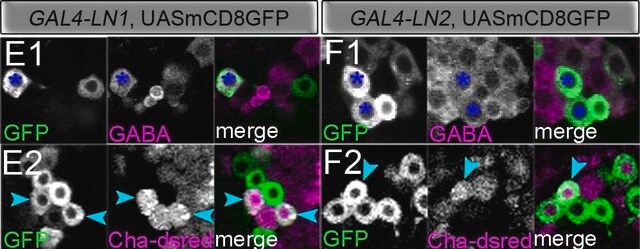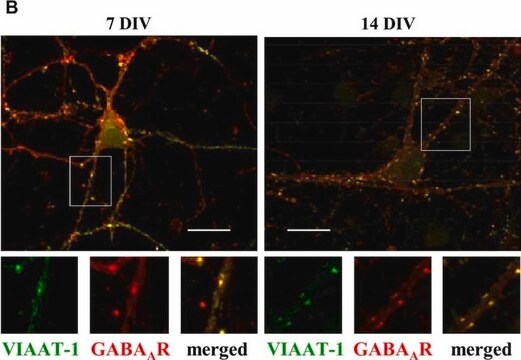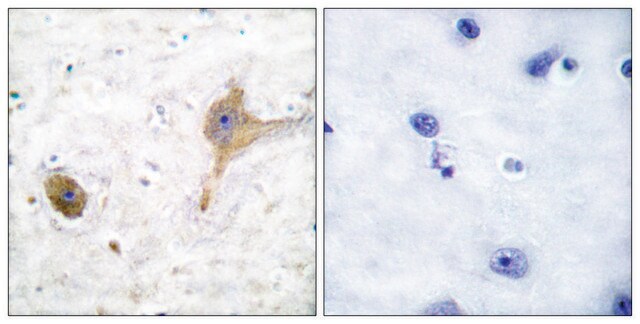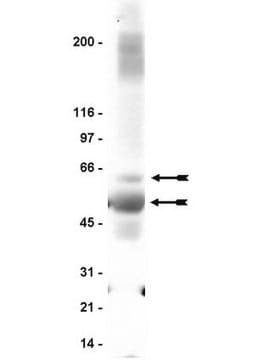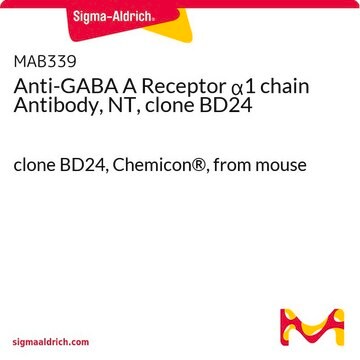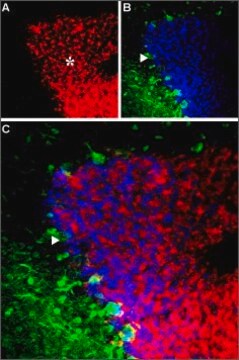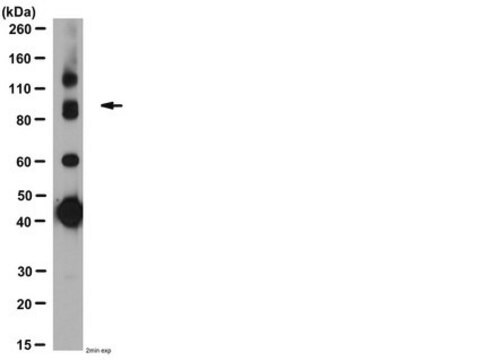추천 제품
생물학적 소스
rabbit
Quality Level
결합
unconjugated
항체 형태
affinity isolated antibody
항체 생산 유형
primary antibodies
클론
polyclonal
양식
lyophilized powder
분자량
antigen ~50 kDa
종 반응성
mouse, rat, human (predicted), bovine (predicted), chicken (predicted)
기술
immunohistochemistry: suitable using rat brain sections
western blot: 1:400-1:1,000 using rat brain membranes
UniProt 수납 번호
저장 온도
−20°C
유전자 정보
human ... GABRA1(2554)
mouse ... Gabra1(14394)
rat ... Gabra1(29705)
일반 설명
GABAA and GABAB receptors differ with regard to their ionic characteristics and pharmacological properties. The GABAA receptor is an ionotropic receptor that forms the GABA gated chloride channel and consists of several heterogeneous subunits with membrane recognition sites for benzodiazapenes.
면역원
peptide corresponding to amino acids 28-43 of rat GABA(A) receptor α1 subunit.
애플리케이션
Anti-GABAA Receptor (α1 subunit) antibody produced in rabbit is suitable for detection of GABA-A α1 subunit by immunohistochemistry using rat brain sections and by immunoblotting at a working dilution of 1:400-1:1000 using rat brain membranes.
생화학적/생리학적 작용
The inhibitory neurotransmitter GABA signals through two distinct types of pre- and postsynaptic receptors, GABAA and GABAB. Both GABA receptors can regulate depression of synaptic transmission and be involved in the inhibition controlling neuronal excitability. α1 is a subtype of GABAA receptor expressed selectively by serotonergic and GABAergic neurons. Serotonergic neurons express strong α3 immunoreactivity but, do not show any α1 immunoreactivity. On the contrary, GABAergic neurons express both α1 and α3 subunits.
물리적 형태
Lyophilized from phosphate buffered saline, pH 7.4, containing 1% bovine serum albumin, and 0.05% sodium azide.
제조 메모
Reconstitute the 0.05 mL vial with 50 μL deionized water. Reconstitute the 0.2 mL vial with 0.2 mL deionized water. After reconstitution, the antibody concentration is ~0.8 mg/mL.
면책조항
Unless otherwise stated in our catalog or other company documentation accompanying the product(s), our products are intended for research use only and are not to be used for any other purpose, which includes but is not limited to, unauthorized commercial uses, in vitro diagnostic uses, ex vivo or in vivo therapeutic uses or any type of consumption or application to humans or animals.
적합한 제품을 찾을 수 없으신가요?
당사의 제품 선택기 도구.을(를) 시도해 보세요.
Storage Class Code
10 - Combustible liquids
WGK
WGK 2
Flash Point (°F)
Not applicable
Flash Point (°C)
Not applicable
Diego Armando León Rodríguez et al.
PloS one, 8(6), e68010-e68010 (2013-07-05)
Different models of rodent maternal separation (MS) have been used to investigate long-term neurobiological and behavioral changes, associated with early stress. However, few studies have involved the analysis of sex-related differences in central anxiety modulation. This study investigated whether MS
Vladimir Jovasevic et al.
Neurobiology of learning and memory, 183, 107459-107459 (2021-05-21)
Alcohol use disorder (AUD) frequently co-occurs with dissociative disorders and disorders with dissociative symptoms, suggesting a common neurobiological basis. It has been proposed that facilitated information processing under the influence of alcohol, resulting in the formation of dissociated memories, might
B Gao et al.
Neuroscience, 54(4), 881-892 (1993-06-01)
GABAA-receptors in the brain display a striking structural heterogeneity, which is based on a multiplicity of diverse subunits. The allocation of GABAA-receptor subtypes to identified neurons is essential for an analysis of the functional significance of receptor heterogeneity. Among GABA-receptive
Hanmeng Zhang et al.
The Journal of physiology, 596(18), 4511-4536 (2018-07-29)
With daily electrophysiological recordings and neurochemical analysis, we uncovered a transient period of synaptic imbalance between enhanced inhibition and suppressed excitation in rat visual cortical neurons from the end of the fourth toward the end of the fifth postnatal weeks.
Qiang-Qiang Xia et al.
Frontiers in cellular neuroscience, 18, 1320784-1320784 (2024-05-28)
Autism Spectrum Disorders (ASDs) are neurodevelopmental disorders (NDDs) in which children display differences in social interaction/communication and repetitive stereotyped behaviors along with variable associated features. Cul3, a gene linked to ASD, encodes CUL3 (CULLIN-3), a protein that serves as a
자사의 과학자팀은 생명 과학, 재료 과학, 화학 합성, 크로마토그래피, 분석 및 기타 많은 영역을 포함한 모든 과학 분야에 경험이 있습니다..
고객지원팀으로 연락바랍니다.
